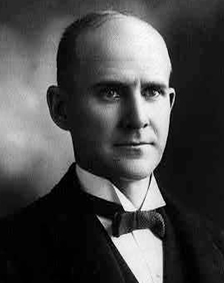 |
Eugene Victor Debs (1855-1926), born in Terre Haute, Ind., entered railroad work as an engine-house laborer and became a locomotive fireman. Elected secretary of Brotherhood of Locomotive Firemen 16 of Terre Haute in 1875, he became grand secretary and treasurer of the Locomotive Firemen and editor of the union's official journal in 1880. Debs resigned as an officer of the brotherhood in 1892 to begin building a single union for all railway workers and resigned the editorship of the journal in 1894. He founded the American Railway Union in 1893, led it in the successful 1894 Great Northern Railroad strike, but was imprisoned for six months in 1895 for his role as president of the union during the Pullman strike. After leaving prison he turned his energies to political activity. In 1896 he supported the People's party campaign, in 1897 he |
| founded the Social Democracy of America, a socialist communitarian movement, and in 1898 he was a founder of the Social Democratic Party of the United States, an organization committed to running and electing socialist candidates.
Debs served on the party's executive committee and in 1900 polled a hundred thousand votes as the presidential candidate of the Social Democratic party and a wing of the Socialist Labor party led by Morris Hillquit. In 1901 he was a founder of the Socialist Party of America, and he ran for president as its candidate in 1904, 1908, 1912, and 1920. In 1905 Debs participated in founding the Industrial Workers of the World , a revolutionary syndicalist industrial union that he hoped would function as the economic arm of the Socialist party; he left the IWW three years later. During World War I, he was prosecuted under the Espionage Act and sentenced to ten years in prison. Although they were longtime rivals, Samuel Gompers supported the campaign for clemency that culminated in a presidential pardon in 1921 . |
Read Debs' June 16, 1918 antiwar speech
Home
WEB Accessibility
Created by The Samuel Gompers Papers Project